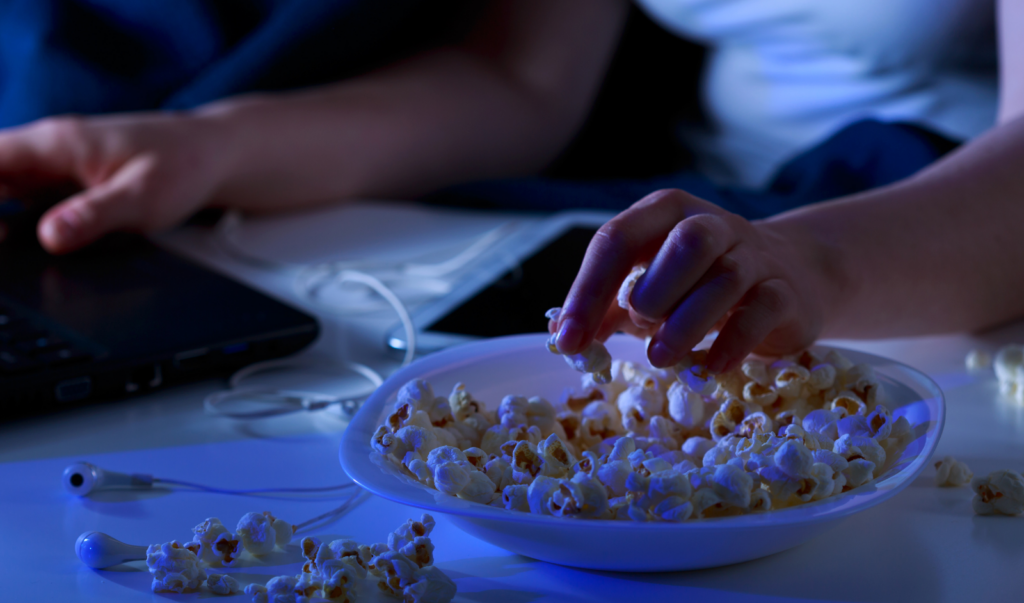How to Stop Snacking After Dinner
Nighttime snackers often consume more than 50% of their daily calories after 8 p.m. Stop snacking after dinner, and losing weight will be much easier. Here are 8 tips.

Overeating after a long day is a common pitfall many people face while trying to lose weight. You know the scenario: You were “good” all day, and then you get home and want to empty the fridge. Or maybe you decide to have an after-dinner treat to unwind — you had a stressful day at the office, after all — and one square of dark chocolate turns into a whole bar (or more). You’re left feeling tortured and wondering, How did that just happen?
One is that you’re physically hungry—and that would be because you didn’t eat enough during the day and this is catch up. Or that you went to, say, a spin class after dinner and are hungry and need a snack.
The third rationale is a little less cut and dried. The brain has neurons that make you repeat habits. It will make us eat for reasons that have nothing to do with hunger, and once the floodgate opens, we’re done.
To make matters more complicated, a recent study in the International Journal of Obesity found that our hunger hormones—leptin, which makes us feel full, and ghrelin, which makes us feel hungry—are hard-wiring us to eat more later in the day. Sigh.
It’s important to note the distinction between overeating and bingeing. Overeating is something that we do now and then. On the other hand, binge eating is eating a whole lot in a short period of time. Binge eaters eat more rapidly, until uncomfortably full. They typically hide food and eat alone. They’re known to have recurring binges—at least once a week for three weeks. It’s about having a lack of control, and it results in shame.
But whether you’re eating one too many snacks after dinner or engaging in full-blown bingeing, these behaviors are important to address, especially if weight loss in your goal. Here are the best strategies for overcoming evening-time eating, plus what to do when you do succumb to it. (Hey, we’ve all been there!)
How to Stop Snacking After Dinner
1. Be a Planner
The old adage, that failing to plan is planning to fail, couldn’t be truer when it comes to establishing a healthy eating pattern. Have food prepared and available, and take care of yourself and eat it. You want to avoid getting too hungry, which makes your body crave more calorie-dense food because it feels like you’re starving.
Another thing to pencil into your schedule: when you’re eating out. You need a plan in place if you’re going to a restaurant or someone’s home. When you don’t have as much control, don’t show up too hungry to the point you can’t make a good choice. That’s one of the reasons “Dining Out” night at Pritikin exists, where a member of the nutrition team brings guests to a local restaurant, to practice skills like ordering and mindfulness.
2. Get Personal
It’s key to figure out your own personal hunger and satiety schedule to ensure you’re eating enough during the day. You’ll start noticing when you’re eating well and enough, to the point that you’re light and comfortable. Ask yourself, what feels better for you? Does a salad with a bean wrap hold you and make you feel comfortable? Or maybe you need more protein. Do you need to eat a bowl of soup or a baked potato at 4 p.m.? It’s personal, and has to do with how much exercise you do, how much stress is in your life.
3. Put Evening Cravings Under the Microscope
Learning to distinguish between hunger and “eating our feelings” is a necessary—albeit confusing—skill. If we want food that’s high salt or high fat or high sugar, that’s because it hits a pleasure center in the brain that processes a hormone called dopamine. Everyone has a different ‘light’: alcohol, sweets, salty. At 10 p.m., if you’re craving a salad, then you’re hungry. If you’re starting to crave something more dense like pretzels, then you’re probably not.
4. Look At the Full Picture
Aside from food itself, there are other sneaky factors that can contribute to overeating, says Gomer, who points to not getting enough sleep. “Sleep affects depression and anxiety, and how we see ourselves,” she reasons.
5. Break Up With Bad Habits
As noted earlier, one of the main reasons why overeating at night occurs is because it’s become a (bad) habit. Say you go on the sofa and then relax with food every night, that’s habitual, and you need to break that chain and do something else. Maybe you go upstairs and take a hot shower or go outside for a walk. Or maybe drink a hot cup of tea. The key is having a plan around the evening.When you notice you’re doing something two or three times in a row, stop it and break the habit
It’s going to be hard [to break the habit] for the first couple of days, but it gets easier. I recommend that my weight-loss clients not snack after dinner, to help break that habit. When you can kick that habit, it’s really freeing and exciting.
6. Eat More Veggies
If weight loss is your goal, and if you live in a cold climate, have a vegetable soup so you have a good, hearty vegetable hit. The key for weight loss is to have the vegetables since they’re low calorie dense. It’s still a numbers game—you need to create a deficit.
7. Love Yourself, No Matter What
If you have two overeating scenarios in a row, put your arms around yourself and forgive yourself. Tell yourself, I’m a human being and this is normal and I’ll eat healthy the next time. We have to have self-compassion.
The next day, give yourself some love and eat healthy food. Limit processed foods, but don’t cut the potato or the carb, since that keeps the cycle alive. This is a process, this is your journey.
8. Know When to Seek Help
If you find yourself bingeing on the regular, it’s probably a good time to seek outside help. When we go into therapy, we learn how our dysfunctional eating patterns affect intake. We find out what the triggers are is it being around a parent? A certain situation? It teaches you to get in charge of yourthinking.
